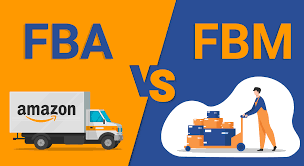When it comes to selling products on Amazon, there are two main options: Fulfillment by Amazon (FBA) and Fulfillment by Merchant (FBM). Both methods have their own set of advantages and drawbacks. In this article, we will explore the differences between FBA and FBM and help you decide which option is best for your business.

Fulfillment by Amazon (FBA)
Fulfillment by Amazon (FBA) is a service offered by Amazon to sellers who want to use Amazon’s warehouse and shipping services. With FBA, sellers send their products to Amazon’s warehouse, and Amazon takes care of everything from storage to shipping to customer service.
Benefits of FBA
- Faster and more efficient shipping: Amazon has a vast network of fulfillment centers across the globe, allowing for faster and more efficient shipping to customers.
- Prime eligibility: Products fulfilled by Amazon are eligible for Amazon Prime, which can increase sales and exposure for your products.
- Easy customer service: Amazon handles all customer service inquiries and returns, saving sellers time and resources.
Drawbacks of FBA
- Higher fees: FBA fees can be higher than FBM fees, cutting into your profit margin.
- Limited control: With FBA, sellers have less control over the shipping and handling of their products, which can lead to issues such as damaged products or incorrect shipments.
- Limited customization: With FBA, sellers cannot customize packaging or include personal notes, which may be important for some businesses.
Example: Let’s say you are a small business selling handmade soaps on Amazon. You decide to use FBA because you want to take advantage of Amazon’s fast shipping and Prime eligibility. However, you notice that the fees are cutting into your profit margin and you cannot include personalized notes with your shipments, which is an important part of your brand. In this case, FBA may not be the best option for your business.

Fulfillment by Merchant (FBM)
Fulfillment by Merchant (FBM) is a service offered by Amazon that allows sellers to fulfill their own orders. With FBM, sellers handle all aspects of fulfillment, from storage to shipping to customer service.
Benefits of FBM
- Lower fees: FBM fees can be lower than FBA fees, allowing for a higher profit margin.
- More control: With FBM, sellers have more control over the shipping and handling of their products, which can lead to better customer experiences.
- Customization: With FBM, sellers can customize packaging and include personal notes, which can be important for branding and customer relationships.
Drawbacks of FBM
- Slower shipping: With FBM, sellers may not be able to offer the same fast and efficient shipping as FBA, which can be a disadvantage in a competitive market.
- More work: With FBM, sellers are responsible for all aspects of fulfillment, which can be time-consuming and resource-intensive.
- More customer service: With FBM, sellers must handle all customer service inquiries and returns, which can be a challenge for small businesses.
Example: Let’s say you are a larger business selling custom t-shirts on Amazon. You decide to use FBM because you want more control over the shipping and handling of your products and you want to include personalized notes with each shipment. However, you notice that your shipping times are slower than your competitors who use FBA, which is impacting your sales. In this case, FBM may not be the best option for your business.
Conclusion
In summary, the choice between FBA and FBM depends on your business’s specific needs and goals. FBA may be a good option for businesses that value fast shipping and Prime eligibility. While FBM may be a better option for businesses that value more control over their fulfillment process and want to reduce their costs. Ultimately, the decision between FBA and FBM will depend on factors such as the size of your business, the nature of your products, and your overall goals and priorities.
Regardless of which fulfillment method you choose, it’s important to carefully consider your options and weigh the benefits and drawbacks of each. By doing so, you can make an informed decision that helps your business succeed on Amazon and beyond.

